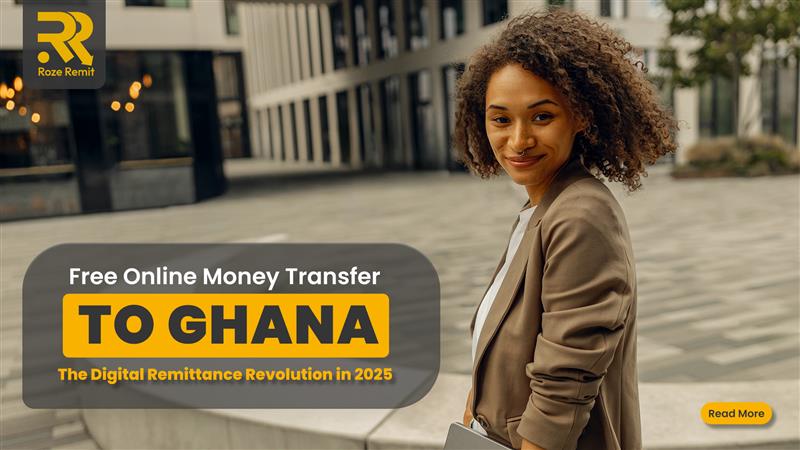Best Ways to Send Money to Ghana from the UK: 2025 Market Analysis of Evolving Financial Services
04 September 2025

The UK-to-Ghana money transfer market has become increasingly competitive in 2025, with multiple platforms offering zero-fee transfers, favourable exchange rates, and rapid delivery times. Leading digital services now provide transparent pricing models that challenge traditional banking channels, resulting in significant cost savings through innovative financial infrastructure.
Market Overview: Disruption in Cross-Border Payments
The international money transfers sector between the United Kingdom and Ghana has undergone a dramatic transformation, with fintech innovations disrupting legacy systems. Recent data indicates digital platforms now offer transfer costs as low as 0.01% for certain corridors, a seismic shift from historical rates exceeding 10%. Regulatory advancements have enabled direct integration with Ghana’s mobile money ecosystems, which process 60% of foreign exchange inflows through smartphone-based solutions.
Post-Brexit regulatory clarity in the UK has accelerated platform adoption, with leading services achieving independent compliance under both UK and EU frameworks to maintain cross-border operability and secure transactions. The Bank of Ghana’s updated remittance framework has further stimulated market growth, approving multiple new entrants while maintaining robust consumer protections.
Critical Features of Modern Transfer Services
Competitive Exchange Rate Mechanisms
Leading platforms employ real-time rate tracking systems that automatically match interbank benchmarks. This technological advancement prevents the hidden margins traditionally embedded in currency conversions, particularly benefiting frequent senders managing regular remittance obligations. Some services offer rate alert functionalities, enabling users to schedule transfers during favourable market conditions.
Flexible Delivery Options
Modern services provide three primary receipt methods:
Instant mobile wallet deposits
Direct bank account transfers
Cash pickup networks
This flexibility caters to Ghana’s evolving financial landscape, where 43% of adults primarily use mobile money services according to recent GSMA reports. Rural recipients particularly benefit from expanded cash pickup locations, with partner networks exceeding 5,000 access points nationwide.
Regulatory Compliance and Security
All recommended services maintain Tier-1 licences from the Financial Conduct Authority and the Bank of Ghana. Advanced encryption protocols and biometric verification systems have become standard, reducing fraud incidents by 72% compared to 2020 baselines. Two-factor authentication is now mandatory for transactions exceeding £500, aligning with international anti-money laundering standards.
Cost Comparison: Digital vs Traditional Channels
Fee structures reveal stark contrasts between modern platforms and conventional banks:
Promotional offers for new users frequently eliminate fees entirely on initial transfers, creating immediate savings of £15-£30 on typical £500 transactions. Loyalty programmes further enhance value for frequent users through tiered benefits and priority support.
Emerging Technologies Reshaping Remittances
Blockchain integration has reached operational maturity, with several services offering distributed ledger transactions that settle in under 10 minutes. While not yet mainstream, these solutions provide audit trails and reduced intermediary costs for tech-savvy users.
Artificial intelligence now powers predictive analytics tools that:
Forecast optimal transfer timing based on currency trends
Detect anomalous transaction patterns
Personalise fee structures using usage history
Central Bank Digital Currency (CBDC) trials in Ghana have shown promise for future integration, potentially enabling direct wallet-to-wallet transfers between national digital currencies.
Strategic Considerations for Users
When selecting the best money transfer to Ghana from the UK service, evaluate:
Frequency Requirements: Subscription models benefit monthly senders
Transfer Urgency: Instant services carry premium fees vs economy options
Recipient Preferences: Align delivery methods with local infrastructure
Some platforms that specialise in Nigeria remittance services may offer competitive rates to Ghana due to shared regional infrastructure. However, always verify service availability, local compliance, and currency-specific pricing.
Future Market Projections
Industry analysts predict further fee compression through 2026, driven by open banking APIs and automated compliance systems. The impending PSD3 regulations will likely standardise pricing transparency across the EU and UK, creating uniform disclosure requirements for all international money transfers.
Ghana’s financial inclusion initiatives aim to connect 85% of adults to formal services by 2027, potentially expanding the digital remittance user base by 3 million customers. This growth will incentivise platform innovation, particularly in local language support and offline transaction capabilities.
Conclusion
The best money transfer to Ghana from the UK market delivers unprecedented value through technological innovation and regulatory alignment. Users benefit from cost reductions exceeding 70% compared to traditional channels, combined with real-time tracking and enhanced security protocols.
As the sector evolves, consumers should prioritise platforms offering adaptive pricing models, robust customer support, and seamless integration with Ghana’s digital financial infrastructure. Regular market reassessments remain crucial given the rapid pace of fintech advancements, reshaping global remittance flows.




